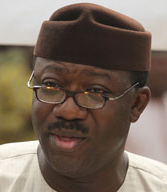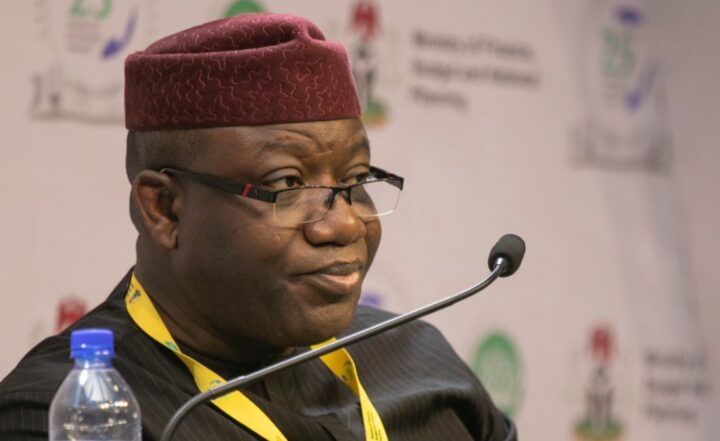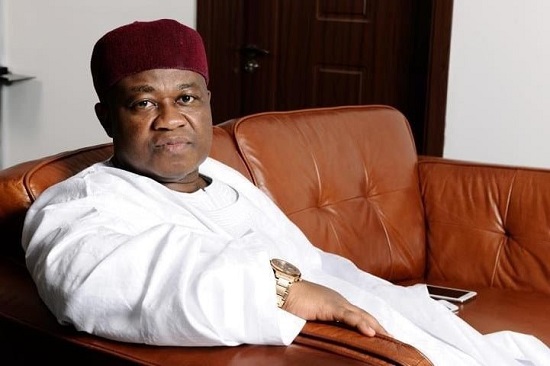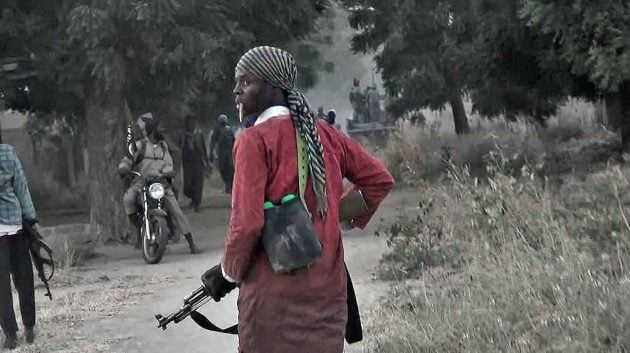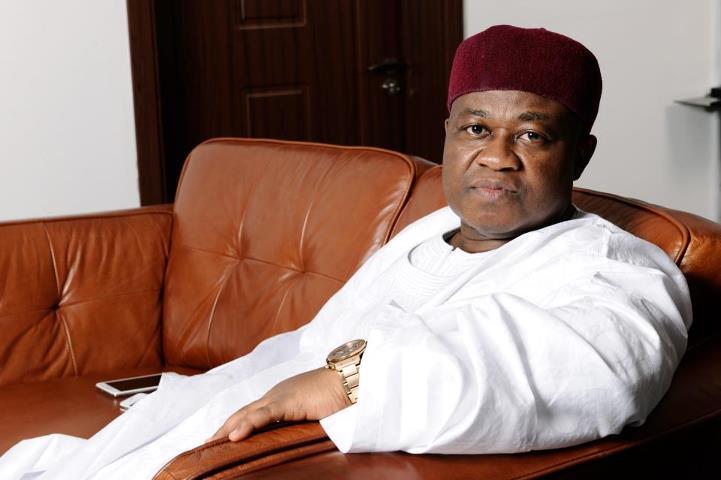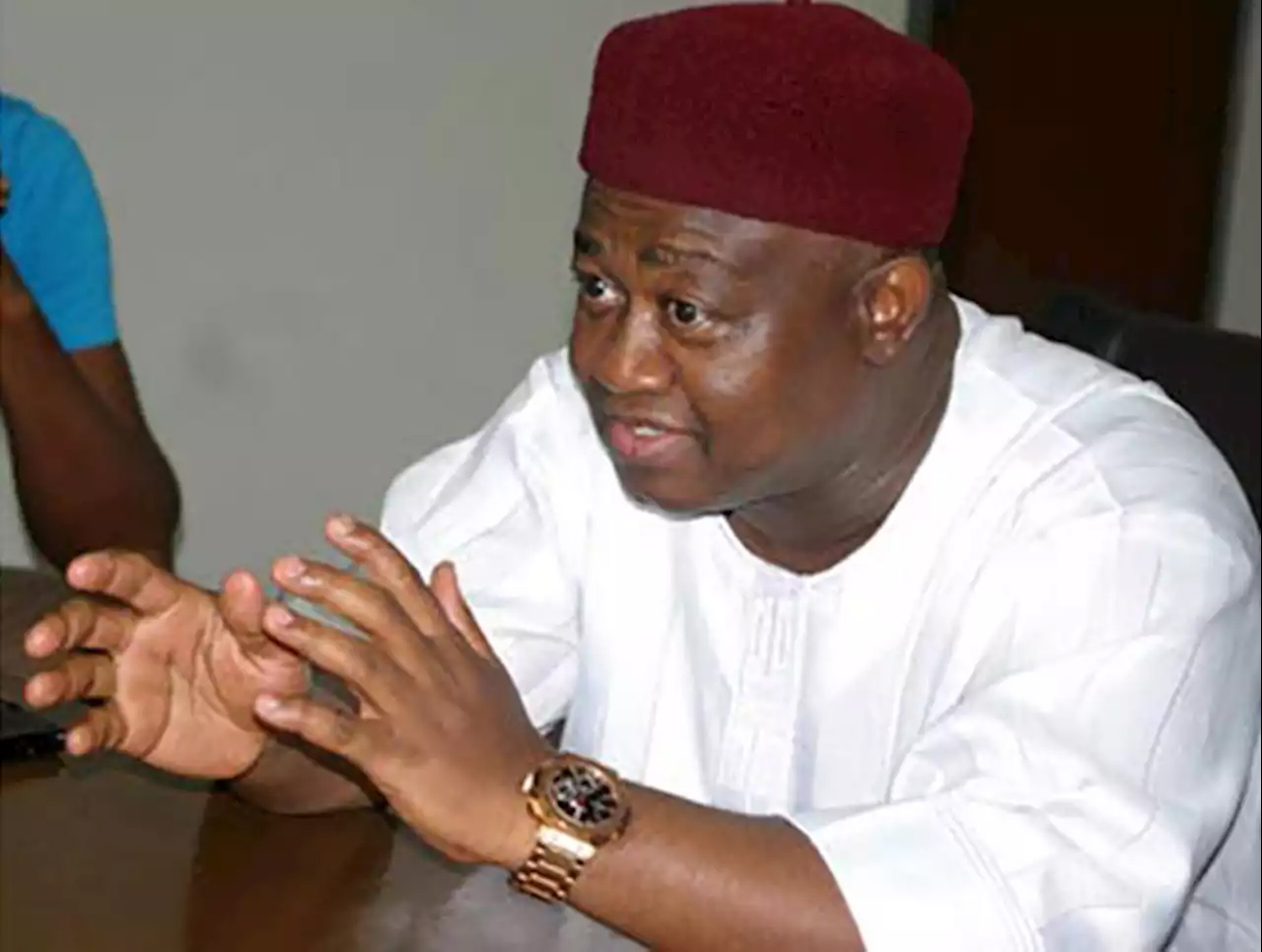Kayode Fayemi
At the combined 70th and 60th birthday celebration of Prof. Sonnie Gwanle Tyoden and Mrs Abigail Tyoden on Saturday, December 19, 2020.
Protocols
Let me start by congratulating His Excellency, Prof. Sonni Gwanle Tyoden, the Deputy Governor of Plateau State and his loving wife and Second Lady, Her Excellency, Mrs. Abigail Tyoden, on the occasion of their 70th and 60th birthday celebration respectively. I am told Prof. was born on September 22, 1950 but had to postpone the celebration because of the prevailing pandemic and he has made this lecture an important aspect of the celebration. As a first-rate academic, one who has mentored many political scientists in my own generation, one should not be surprised that he has considered important, an academic forum like this to celebrate his elevation to the landmark age of a septuagenarian.
I also want to specially thank my friend and brother, His Excellency, Governor of Plateau State, Rt. Hon. Simon Bako Lalong, for the warm reception and the wonderful leadership he has always provided in the State, in the north as Chairman, Northern Governor’s Forum, and in Nigeria generally. Governor Lalong is an amiable, amazing and reliable gentleman.
Advertisement
The proposed topic as originally sent to me has been slightly modified from “Academicians in Politics” to Intellectuals in Politics: Contributions and Legacies in Public Service. I have added a rider to the original topic to further widen the content and the relevance of the topic to the event of today and our national life in general.
Conceptualizing “Academic”
The curious question to ask is: who is an academic? This question, on the face, seems simple but a rigorous interrogation will leave one with the reality that it may not be as simple as it seems. To start with, academics could be described simply as a people who are members of an academy such as Royal Academy of Science, Arts or Medicine, as you have in the United Kingdom or as in the case of Nigeria where we have Academy of Letters and Academy of Science.
Advertisement
Academics of this hue are generally very prominent members of an academic discipline whose works have had a tremendous influence on the field of discipline. It is like a fraternity of elite scholars, promoters or influencers in a particular discipline. More importantly and in rare cases, one does not have to be a scholar or a university don to belong in this kind of Academy. Conversely, it is not every professor or university don that automatically becomes an academic.
Many people are inducted into such an academy because of the sheer force of their contribution to practice or promotion through funding and endowments. For example, a distinguished musician who has made a great influence on the practice of Music could be inducted into the Academy of Arts, even without being a university teacher.
Meanwhile, in a loose sense, and as it is common with North Americans, an academic could also be an academic; that is, a member of the academia. Someone who works as a teacher and a researcher in an ivory tower or a research institute. Furthermore, it could also mean an intellectual.
In the latter sense, we could even further argue that there is a difference between an academic intellectual and a public intellectual. The two don’t have to be mutually exclusive but it could be pointed out that one does not need to be an academic to be a public intellectual. It is, however, a common phenomenon to see that public intellectuals are mostly connected to the gown community but are very visible in town affairs.
Advertisement
In this lecture, therefore, I will want to dwell more on the place of intellectuals or more specifically, public intellectuals in our politics and national life.
Perspectives on Intellectuals in Politics
As I have indicated, I conceptualize academics in this address within the framework of intellectuals. I further extend the definition of intellectual to include not only academics but public intellectuals who engage in intellectual debate about topical national discourse.
From generation to generation, a segment of the society has always concerned itself with the business of public debate and advancement of specific position on topical issues. This segment of the society is known for its analytical and deeply persuasive agglutination of problems and prescription of solutions to contemporary concerns. In most cases than not, they have often served as springboards for radical social changes with enduring implications.
Advertisement
Most times, they serve as social change agenda-setters through vigorous pursuit of a new cause and an agitation to reinvent and innovate from an unworkable experience. Where they are not professional academics themselves, they help to kick-start academic conversation around issues they seek to put in the front burner for public discourse.
Historically, dating back to the Classical Age, Socrates and his students, especially Plato who was reputed for his rigorous appraisal of public concern in a deeply philosophical and academic manner, were deeply concerned with public affairs as intellectuals. Plato’s The Republic clearly attested to the role of a public intellectual in a polity. One of the favourite quotations that is often associated with Plato in The Republic is his riposte that: until philosophers are kings, or the kings and princes of this world have the spirit and power of philosophy, and political greatness and wisdom meet in one, and those commoner natures who pursue either to the exclusion of the other are compelled to stand aside, cities will never have rest from their evils – no, nor the human race, as I believe, – and then only will our State have a possibility of life and behold the light of day – Plato (427-347 B.C.)
Advertisement
There is no doubt that Socrates was a thought-leader, a public intellectual and a philosopher who had a tremendous influence on his contemporary society and beyond. Plato, his student who helped to record most of what is known of Socrates devoted much of his attention to the challenge of intellectual content in the administration of Athens. In fact, the word “Academy” came to be known as we know it today, because of the Academy he founded in the olive grove of Acamemus where he propagated the Pythagorean ideology he came about in Sicily.
Aristotle who served his tutelage under Plato went on to further expound the many subjects of enquiry which had engaged the attention of his academic forebears. He is remembered for giving academic definitions and distinctions to many of the enduring fields of academic studies as we know them today. The two of them are mostly celebrated for their influence on western thought and philosophy which are the pillars upon which western systems are erected.
Advertisement
Even though Plato was deeply interested in the politics of his time, especially the circumstances that led to the execution of Socrates, he vigorously spoke against democracy but advocated a system of government which he propagated in his book, Plato’s Communism, where he argued that only the well informed in the society should be involved in the affairs of State. In other words, Plato believed only the well-educated and public-spirited intellectuals should be in charge of the governance of the people. While this is definitely inconsistent with the universal suffrage and popular representation that we have today, it only headlines the importance that was attached to public intellect in the society.
In other clime and during another epoch, intellectuals have not only served as moral compass and conscience, they have played pre-eminent roles in the political life of their country. In Great Britain for instance, John Donne (1571-1631) a celebrated metaphysical poet, lawyer, theologian, priest and social critic was also a public intellectual in government as he served as a diplomat, Member of Parliament and Secretary of the Lord of the Keeper of the Seal in the government of the United Kingdom.
Advertisement
John Milton was an excellent poet, public servant and more importantly, the father of freedom of speech during his time. His critics were fond of calling him an acrimonious and surly republican because of his opposition to monarchy and vehement advocacy for republican ideology. Edmund Burke (1729-1794) was another great poet and social commentator who was also a distinguished Member of Parliament. Another great example is Richard B. Sheridan (1751-1816), a playwright and politician. He was not only a socialite, public commentator but one of the finest parliamentary debaters of his era.
In the United State of America, founding fathers such as Benjamin Franklin, Thomas Jefferson and James Madison were vociferous campaigners against British government policy in the American colonies. They used the instrumentality of public intellectualism such as pamphleteering, debates and ideological propagation to give the New World the constitutional and governmental system that has become the pride of the United State of America.
This tradition also manifested in the colonial Africa as many of the forerunners in the anticolonial movements were first and foremost, public intellectuals who mobilised their compatriots through debates, conferences, writings, and other forms of public campaigns. Many of the founding fathers were either teachers, lawyers or journalists – professions that were historically associated with public intellectuals because of the proximity of their profession to public spheres where they could influence opinion as moral agents.
Notable among these public intellectuals were Herbert Macaulay, Dr. Nnamdi Azikiwe, Julius Nyerere of Tanzania, Dr. Kwame Nkrumah of Ghana among others. Similarly, you had such other Nigerian nationalists who were public intellectuals and politicians. Chief among them are Chief Obafemi Awolowo, a first-class thinker, ideological intellectual, prolific writer, stenographer, lawyer, businessman and publisher; Dr. Russel Aliyu Barau Dikko, first medical doctor from the north, former minister, public affairs mobiliser and one of the founders of Northern People’s Congress; Sir Tafawa Balewa, whom Time Magazine of London of November 10, 1958 described as a scholarly parliamentarian because of his unequalled eloquence and brilliance and Dr. Nnamdi Azikiwe, an engaging orator, prolific writer, journalist and publisher. These great forerunners fit into the definition of public intellectuals in politics.
In Ekiti, where scholarship and learning are highly valued, many of our political leaders of notable reckoning were mostly recruited from the classroom. So, we are a society that pays great values on academic achievement and celebrated intellectuals in leadership. In the first republic, we had great men such as Chief Joel Babatola, a distinguished educationist and towering personality and Chief Oduola Osuntokun, another teacher who was a first republic Minister. Professors Banji Akintoye and Sam Aluko, renowned historian and economist and public intellectuals were some of the eggheads that defined and gave the ideological identity to the Unity Party of Nigeria.
In fact, political leadership recruitment in Ekiti had always been drawn from the academia. In the second republic, out of the three senators that represented Ekiti, two were university dons. Prof Banji Akintoye and Prof David Oke; the third person, Senator Ayo Fasanmi was a renowned pharmacist. Dr. Bode Olowoporoku, a university teacher was a minister in 1983. In recent time, Prof. Tunde Adeniran and Late Prof. Babalola Borisade were ministers of education from Ekiti, they served in the government of President Olusegun Obasanjo. They represent some of the academic intellectuals that have held political positions in recent times. So, we have always had them in public office and at the risk of sounding immodest, yours sincerely, standing here before you, is another eloquent proof of this tradition.
Intellectuals and Political Participation
As noted by Thomas Sowell (2011), the work of the intellectuals is based on certain principles – of logic, evidence and perhaps moral values or social concerns. But the most important duty of an intellectual is to serve as a thinker, a visionary, a gatekeeper, a mobiliser and a watchman. He is, therefore, ultimately a social philosopher who is able to aggregate and distill complex contemporary challenges and proffer workable solutions, some of which may be far reaching and revolutionary.
It must however be pointed out that intellectuals do not just abstract isolated opinions on public concerns, some of which are not even apparent and discernible to the everyday person, they opine based on their conceptualization of the prevailing reality by digging into both historical and longitudinal analysis of contemporary challenges, sometimes from the benefit of scholarship or from the force of logical intuition. The first duty of an intellectual is to problematize conflicting forces of thoughts and to coalesce them into an organic definition that clearly identifies areas of convergence and divergence. He diagnoses the insets, outsets and the subsets before providing a prognosis which the agency of state will be expected to adopt for the progress of all.
Sadly, however, intellectuals often fall into the danger of the impunity of caste binary and social piety which goad them into wanting to do nothing than excogitate probable formula to articulated problems without wanting to be stained with the brush of practical politics. So, they sound not only detached but insular. So, many people have come to cast doubt on the worth of the currency of a people who know, create and read the map but can’t find their way home.
Some intellectuals even see political participation as some form of infidelity and/or apostasy. The popular stereotype is that politics is not for the social intellectuals or so called decent men, and that only the most venal and people of the worst character should be politicians. The intellectuals are very scared of the poisonous darts of criticism freely thrown at politicians, they themselves cannot possibly accept to be seen in that satanic image that the politician has been sculpted.
However, the greatest challenge that intellectuals face working from the outside is that they are often perceived as idealistic, theoretical and conceited. Their vision and goals are sometimes considered to be utopian and unrealistic; so, their social vision and formula are often suspected to be inchoate at best or vague at worst. Yet, it is the given wisdom that intellectuals are the morally anointed with the mandate to normalize the abnormality of the inherent flaws that continue to plague humanity and the social contrivances that continually attenuate conflicts, not only of vision, but of how to solve the imbalances that affect human relations.
It is generally believed that the political arena is a dungeon and burrows for sorrows. It is a land of chaos and landmines. Politics is often defined as too dirty for a gentlemen to participate in. The muck-raking, intrigues, backstabbing, doublespeak and brave hypocrisy are some of the vices that nauseate many intellectuals and continue to be a push back for their participation. Some have accused them of being too puritanical and conceited to think that they are too refined to interact with the masses of the people they seek to save.
It seems the intellectual is too pure to associate with those they see as the dregs of the society. It is even said that the fact that intellectuals cannot device an alternative system that will become the new testament of political behaviour, itself is an unpleasant indictment on the veracity of the intellectual efficacy of the supposed saviors. What evidence of compassion and keen interest in the wellbeing can the intellectuals possibly advertise if they are not moved by the force of empathy and passion to throw themselves into the political swam to drain it of mud and clean it of its toxicity? Isn’t this a submission to failure? Can we surrender to the suggestion that so-called intellectuals are actually impervious about the condition of social imbalance and injustice that has created poverty and despondence?
Critics of the intellectuals have also pointed out that they generally lack grit, focus, practical knowledge, synergy, experience and strategy to implement their beautiful manifestoes of an Eldorado. And so, in our clime, intellectualism is often seen as leisurely rendezvous. Many have come to see self-acclaimed intellectuals as nothing but careerists in anti-establishment demagoguery. When they are seen in this frame, the very essence of their place in the social orbit is not only demeaned but lost.
Tyoden as an Exemplar
It is often said within the civil society fraternal world that don’t agonize but organize. This quip popularized by my late Comrade, Tajudeen Abdul-Raheem, is a functional statement that exalts taking action to confront the observed societal ills rather than nagging over them. The intellectuals who by all standard are the society’s most enlightened cannot be seen solely as some incoherent idealists who lack the force of courage to play in the arena of public affairs but stand at a distance to bark like a toothless dog.
Prof. Sonnie Tyoden is by all standards a man of towering intellectual achievement. His brilliance is without doubt and this is evident in his contribution to knowledge and grounded studies in political science and development. A distinguished scholar and seasoned teacher, Prof Tyoden embodies the totality of academic excellence. A successful academic, a prolific writer, a seasoned university administrator, a prodigious researcher and now, an exemplary intellectual in politics, he continues to provide a beautiful illustration about the pre-eminence of eagerness over procastination.
As an intellectual, and in spite of his towering achievements as a scholar, Prof. Tyoden, remains a self-effacing gentleman, an unassuming and extremely humble personality. It must be noted that there are intellectuals who elevate their intellect above everyone else and condescendingly relate with the members of the society that gave them a platform for their vocation. But Prof. Sonnie Tyoden, has maintained the virtues of modesty and humility, empathy and solidarity, service and sacrifice and above all, godliness and contentment.
His foray into partisan politics has demystified the unfounded notion that intellectuals are not suited for the rough and tumble highway of politics and that politics is the trade for the scoundrels – an arena that “holy” men, as some intellectual sanctimoniously see themselves, should avoid like a plague.
As Deputy Governor of Plateau, I have observed the kind of uncommon fraternal conviviality that exists between him and the Governor; I have seen the atmosphere of mutual respect. I have observed his imprints in the progressive educational policies in the state. I have noted his deployment of professional diplomatic acumen in the management of relationships and crisis in the State.
What we have learned from the industrious life of Prof Tyoden is that when service is the ultimate goal, ego and pride would not take the front seat.
Like Plato, I do believe, the training of the intellectuals especially, academics, is one that has well prepared them for high offices and responsibility. For instance, the main goal of a doctor of philosophy’s training is to prepare the individual with the right skill and discipline to first doubt, seek knowledge and then find out.
These are the qualities which Plato assumed to be the virtues that a philosopher king must possess. A philosopher king will not act to impress, act on impulse, work with short-sighted briefing, be stampeded to take action, nor indulge in superstitious speculation to existential problem. The academic intellectual is a public-interest person who is concerned with solving daily challenges facing humanity. His desire to see that humanity lives a better life and that this can only be attained through carefully thought-out solution to the challenges that exist.
Unfortunately, because intellectuals don’t easily succumb to populism or involve in phantasmagorical indulgence, they are often seen as ‘poor’ politicians. Their fidelity to rational procedures and methodical processes are seen as elitism, unrealistic fastidiousness. There is the popular narrative that a politician must be streetwise, populist and opportunistic. He is supposed to use guile, devious and specious means to achieve his political goals. These are the very antipathy to the core values of an intellectual who thrives on rigorous reason and vigorous enquiry.
This dilemma of values is truly discouraging to many intellectuals who find the political room too suffocating for them to survive in. But it must be pointed out that in spite of this dilemma, many have courageously braved the situation to get in there and serve as an example. What the likes of Prof. Tyoden have taught us is that the solution to the inadequacies and clash of values in our politics cannot be to present intellect as a counterpunch to politics. It must not be foregrounded that political participation is not the arena that intellectuals are welcomed.
You need the enlightenment of the intellectuals and the raw talent of the grassroots politicians to be able to coagulate a workable political practice that serves the nation. You need the discipline of the intellectuals or technocratic individuals to build strong and sustainable institutions that cannot be easily compromised. For autonomous institutions to play a positive role in mediating citizens’ choices, their organic development must be combined in a more nuanced manner and a more systematic way with the use of public and state power.
No one should go with the impression that my thesis here is that every intellectual must play partisan politics. Even though we are all political animals with inescapable interest in the process and outcome of politics, I do not hold the view that every intellectual must necessarily be a politician. It is however, my profound conviction that our nation and indeed, the whole of Africa requires now, more than ever, a new breed of enlightened, thoughtful, knowledgeable politicians with integrity and character, who are courageous, broadminded, balanced and are capable of living beyond their close circle to set a new path to our national rediscovery.
Nothing brings the point closer home than the current agitations against police brutality and associated matters. While the agitation has won on the score of purpose and mass action, there is the need to have an intellectual face and base to the agitation in order to make it a sustainable catalyst that can further cause major socio-economic changes that will have enduring impact on our polity.
This lack of intellectual dimension to the agitation virtually outsourced the formidable movement into the hands of people of undefined and shady interests that threatened the peace and progress of the country. Like many people have pointed out, my fear is that it could potentially lead to the frittering away of the gains that have already been achieved and can still be achieved.
I, therefore, appeal to the concerned persons to be more organic, strategic and intellectual in the articulation of their needs and the pursuit of their goals.
Finally, I believe we need men and women who are nationalistic, decent, altruistic and non-ethnocentric to lead the way to the Nigeria of our collective dream. I am very proud to attest that Prof. Tyoden represents the finest of this breed as I’m sure his wife also. His cosmopolitan education and career mobility have shown him as a man with the right network and connections.
As I end this speech, I want to congratulate Prof. and his amiable wife on their birthday. On behalf of my wife, the Government and the good people of Ekiti State and the Nigeria Governors’ Forum, I wish you long life and good health in the service to our fatherland.
Dr. Kayode Fayemi, CON
Governor of Ekiti & Chairman, NGF
December 19, 2020
Jos, Plateau State
Views expressed by contributors are strictly personal and not of TheCable.
